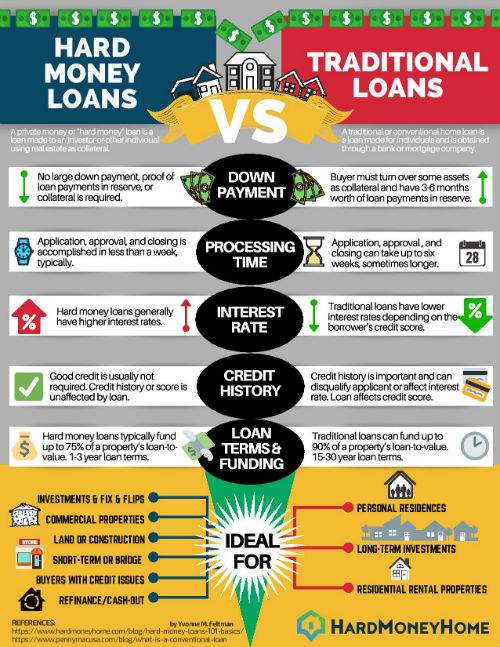If you are considering purchasing land and are in need of financing, you may be wondering if a hard money loan is a viable option for you. A hard money loan is a type of short-term loan typically used in real estate transactions, known for its fast approval process and flexible lending criteria. This article will explore the possibility of using a hard money loan for land purchase, providing valuable insights and considerations to help you make an informed decision.
What is a hard money loan?
Definition
A hard money loan is a type of financing that is secured by real estate. Unlike traditional bank loans, which are based primarily on the borrower’s creditworthiness and income, hard money loans are backed by the value of the property being purchased. These loans are typically used by real estate investors or individuals who may not qualify for traditional financing due to credit issues or the need for a fast approval process. Hard money loans are typically short-term loans that come with higher interest rates and more flexible terms than traditional loans.
Characteristics
There are several key characteristics of hard money loans that differentiate them from traditional bank loans. Firstly, hard money loans are asset-based, meaning the property being purchased serves as collateral for the loan. This allows lenders to focus less on the borrower’s credit history and more on the value of the property. Additionally, hard money loans often have shorter repayment terms than traditional loans, typically ranging from six months to three years. Lastly, hard money loans tend to have higher interest rates due to the higher risk associated with these types of loans.
Considerations for land purchase
Assessing the viability of the land
Before considering a hard money loan for a land purchase, it is crucial to assess the viability of the land itself. This includes evaluating factors such as location, zoning regulations, access to utilities, and any potential environmental or legal issues. Conducting thorough due diligence on the land can help determine its potential for development or future use, which will ultimately influence the financing options available.
Determining financing options
Once the viability of the land has been assessed, it is essential to explore various financing options, including hard money loans. While traditional bank loans may offer lower interest rates and longer repayment terms, they often have stricter lending criteria and longer approval processes. Hard money loans, on the other hand, can provide a faster and more flexible financing solution, particularly for borrowers who may not meet the requirements of traditional lenders. Understanding the options available and weighing the pros and cons of each will help determine the most suitable financing route for the land purchase.

Criteria for using a hard money loan
Existing assets as collateral
One of the main criteria for using a hard money loan is having existing assets that can be used as collateral. Since hard money loans are primarily secured by real estate, borrowers should have sufficient equity in the land or other properties to secure the loan. This is because hard money lenders rely on the value of the collateral to mitigate the risk of default. If the borrower is unable to repay the loan, the lender can foreclose on the property and sell it to recover their investment.
Land evaluation
Another important criterion for using a hard money loan for land purchase is evaluating the land itself. This involves assessing factors such as location, zoning regulations, access to utilities, environmental considerations, and any legal restrictions. Hard money lenders will typically conduct their own evaluation of the land to determine its market value and potential for development. The results of this evaluation will influence the loan amount, interest rates, and terms the lender is willing to offer.
Interest rates
Interest rates are a significant consideration when using a hard money loan for land purchase. Hard money loans generally have higher interest rates compared to traditional bank loans. This is because hard money lenders are taking on higher levels of risk by providing financing based primarily on the collateral rather than the borrower’s creditworthiness. It is crucial to carefully consider the interest rates being offered by different lenders and assess the impact they will have on the overall cost of the loan.
Benefits of using a hard money loan for land purchase
Faster approval process
One of the significant benefits of using a hard money loan for land purchase is the faster approval process. Traditional bank loans often involve lengthy paperwork, strict underwriting processes, and multiple layers of approval, which can take several weeks or even months. In contrast, hard money lenders are primarily concerned with the value of the collateral and the potential for a successful land purchase, making the approval process much quicker. This can be particularly advantageous for real estate investors or those in need of immediate funds for a time-sensitive land purchase.
Flexible terms
Hard money loans offer more flexibility in terms than traditional bank loans. While conventional loans may have fixed repayment terms and rigid structures, hard money lenders can tailor the terms of the loan to meet the specific needs of the borrower. This includes options such as interest-only payments, balloon payments, and flexible repayment schedules. This flexibility allows borrowers to structure the loan in a way that aligns with their financial goals and the anticipated returns from the land purchase.
Opportunity for investment
Using a hard money loan for land purchase can provide an opportunity for investment and potential growth. By securing the land with a hard money loan, borrowers can take advantage of new development opportunities, property appreciation, or other investment strategies. This flexibility and potential for higher returns make hard money loans an attractive option for investors looking to maximize their real estate portfolios.

Drawbacks of using a hard money loan for land purchase
Higher interest rates
One of the main drawbacks of using a hard money loan for land purchase is the higher interest rates associated with this type of financing. Hard money loans typically have interest rates that are significantly higher than those offered by traditional bank loans. This is due to the increased risk and shorter repayment terms often associated with hard money loans. Borrowers must carefully assess the impact of higher interest rates on the overall cost of the loan and ensure that they can comfortably meet the financial obligations associated with the loan.
Shorter repayment terms
Another drawback of using a hard money loan for land purchase is the shorter repayment terms. Unlike traditional bank loans, which may have repayment terms ranging from 15 to 30 years, hard money loans are typically short-term loans with repayment terms ranging from six months to three years. This can increase the financial pressure on borrowers, as they must repay the loan within a shorter timeframe. It is crucial to carefully assess the feasibility of repaying the loan within the given timeframe and have a clear plan in place for doing so.
Potential risks
There are inherent risks associated with using a hard money loan for land purchase. If the borrower fails to repay the loan or defaults, the lender has the right to foreclose on the property and sell it to recover their investment. This can result in the loss of the land and any equity or investment made in the property. Additionally, if the land does not appreciate or meet the anticipated potential, the borrower may face challenges in selling or refinancing the property. It is essential to carefully assess these risks and have contingency plans in place to mitigate potential adverse outcomes.
The hard money loan application process for land purchase
Finding a trustworthy lender
The first step in the hard money loan application process for land purchase is finding a trustworthy lender. It is crucial to research and vet potential lenders to ensure they have a solid reputation, experience in land financing, and a track record of successful transactions. Seeking referrals and recommendations from real estate professionals or other trusted sources can help identify reputable hard money lenders.
Preparing necessary documents
Once a suitable lender has been identified, the borrower will need to prepare the necessary documents for the loan application. This typically includes providing information about the land being purchased, current financial statements, proof of income, credit history, and any other documentation required by the lender. It is important to ensure all documents are accurate, up-to-date, and organized to expedite the loan application process.
Submitting the loan application
After preparing the necessary documents, the borrower can submit the loan application to the lender. This can typically be done online or in person, depending on the lender’s preferred method. The application will generally include information about the borrower, details about the land being purchased, the desired loan amount, and any other specific requirements or preferences.
Review and approval process
Once the loan application has been submitted, the lender will review the application and conduct their own evaluation of the land and the borrower’s financial position. This may include assessing the market value of the land, verifying the borrower’s financial information, and conducting background checks. If the lender determines that the land purchase and borrower meet their criteria, they will notify the borrower of the loan approval and provide details on the loan terms and conditions.

Factors to consider when choosing a hard money lender
Experience and reputation
When choosing a hard money lender, it is essential to consider their experience and reputation in the industry. Lenders with a proven track record of successful land transactions and positive customer feedback are more likely to provide reliable and professional services. Seeking recommendations and conducting thorough research on potential lenders can help ensure the selected lender has the necessary expertise and a solid reputation.
Interest rates and fees
Interest rates and fees play a significant role in the overall cost of the loan. It is important to compare the interest rates and fees offered by different hard money lenders to assess the most competitive options available. While interest rates are typically higher than traditional bank loans, borrowers should aim to secure the most favorable rates and fee structures to minimize the financial burden.
Loan terms and flexibility
Loan terms and flexibility are crucial considerations when choosing a hard money lender. Assessing factors such as repayment terms, payment schedules, and potential penalties or fees for early repayment will help determine the most suitable lender. Additionally, flexibility in loan structures and customized repayment plans can provide borrowers with options that align with their financial goals and capabilities.
Customer reviews and testimonials
Reading customer reviews and testimonials can provide valuable insights into the lender’s reputation and customer satisfaction. Reviews from previous borrowers can shed light on the lender’s communication, responsiveness, and overall experience when working with them. Positive reviews and testimonials can help instill confidence in the lender and their ability to deliver quality service.
Alternative financing options for land purchase
Traditional bank loans
Traditional bank loans are a common alternative to hard money loans for land purchase. These loans typically have lower interest rates and longer repayment terms, making them more attractive for borrowers with strong credit histories and stable income. Traditional bank loans, however, often require extensive documentation, strict underwriting processes, and longer approval timelines.
Government-backed loans
Government-backed loans, such as those offered by the U.S. Small Business Administration (SBA) or the U.S. Department of Agriculture (USDA), can also be a viable alternative for land purchase. These loans are designed to support specific industries or land uses, such as agriculture or small businesses, and often come with favorable interest rates and flexible terms. However, government-backed loans may have more stringent eligibility criteria and longer approval processes.
Private lending options
Private lending options, such as loans from friends, family, or private investors, can provide an alternative source of financing for land purchase. These loans often come with more flexible terms, customized repayment plans, and potentially lower interest rates. However, it is important to carefully assess the potential impact on personal relationships and ensure clear repayment terms and agreements are in place.

Case studies of successful hard money land purchases
Example 1: Residential land development project
In this case study, an experienced real estate developer identified a promising piece of land for a residential development project. Due to time constraints and a desire for fast financing, the developer opted for a hard money loan. The lender conducted their evaluation of the land and approved the loan based on the value of the property. The flexible terms of the hard money loan allowed the developer to commence construction immediately and complete the project within the desired timeline. The successful sale of the developed residential units generated a significant profit, enabling the developer to repay the hard money loan and achieve a favorable return on investment.
Example 2: Commercial land acquisition
In this case study, a small business owner recognized an opportunity to expand their operations by acquiring a strategically located commercial land. Since traditional bank loans were not a viable option due to the borrower’s limited credit history, the business owner turned to a hard money lender. The lender evaluated the land’s market value and approved the loan based on the collateral. The business owner was able to secure the land and commence operations, capitalizing on the prime location. The high revenues generated from the business enabled the borrower to repay the hard money loan within the agreed-upon timeframe and achieve significant growth in their business.
Final thoughts on using a hard money loan for land purchase
Assessing individual circumstances, weighing the pros and cons, and considering long-term financial goals are crucial aspects when considering the use of a hard money loan for land purchase. While hard money loans offer faster approval processes, flexible terms, and potential investment opportunities, they come with higher interest rates, shorter repayment terms, and inherent risks. It is important to conduct thorough due diligence, explore alternative financing options, and work with reputable lenders to make an informed decision that aligns with the borrower’s specific needs and financial objectives.




